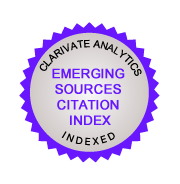Haciendo con otras y nosotras, por una institucionalidad en devenir. Museo en red y las prácticas del afecto en el Museo Reina Sofía = Doing with Others and Ourselves, for an Institutionality-in-becoming. Museo en red and the Care Practices in Museo Reina Sofía
DOI:
https://doi.org/10.5944/etfvii.8.2020.27492Palabras clave:
Feminismos, Institucionalidad, Interdependencia, Cuidados, Redes, Ecosistema, Teorías prácticas = Feminisms, Institutionality, Interdependence, Care, Networks, Ecosystem, Practical TheoriesResumen
Este artículo plantea las potencialidades de movilizar prácticas feministas en y desde la institución a partir de las experiencias de Museo en Red, una área del Departamento de Actividades Públicas del Museo Nacional Centro de Arte Reina Sofía. El ejercicio diario de prácticas de cuidados y el trabajo con diversos agentes sociales es atravesado por posicionamientos en materia de gestión de recursos comunes y haceres situados en el ecosistema cultural, socioeconómico y político. El reconocimiento de interdependencia y el trabajo a largo plazo son claves en un proceso frágil y fértil, que usa una metodología de pensar las prácticas como constructos teóricos para generar un espacio de reflexión crítica, una institucionalidad en devenir.
Abstract
This article considers the potential of movilizing feminist practices from and within the institution taking as starting point the experiences of Museo en Red, an area of the Public Activities Department of Museo Nacional Centro de Arte Reina Sofía. The daily practices based on care and work with various social agents are interfered by taking position in matters of common resources managing and situated practices in the cultural, socio economic and political ecosystem. The acknowledgement of interdependence and working on a long term basis are key in this fragile yet fertile process, which uses a methodology of thinking the practice as theoretical constructs to generate a space of critical reflection, an institutionality-in-becoming.
Descargas
Citas
Federici, Silvia: El patriarcado del salario. Críticas feministas al marxismo. Madrid, Traficantes de Sueños, 2019.
Gago, Verónica: «#Nosotras paramos: notas hacia una teoría política de la huelga feminista», en VV.AA.: 8 M Constelación feminista. ¿Cuál es tu lucha? ¿Cuál es tu huelga? Buenos Aires, Tinta Limón, 2018, pp.7-23.
Galindo, María: ¡A despatriarcar! Feminismo urgente. Buenos Aires, Lavaca, 2014.
Herrero, Yayo: La vida en el centro. Voces y relatos ecofeministas. Barcelona, Libros en acción, 2018.
Haraway, Donna: Seguir con el problema. Generar parentesco en el Chthuluceno. Bilbao, Connsoni, 2019.
Sonderegger, Ruth: «Anything but a Safe Space», en Meinche Hansen, Sidsel, & Vandeputte, Tom (eds.): Politics of Study. Londres, Open Editions, 2015, pp. 40-48.
Vasallo, Brigitte: Pensamiento monógamo. Terror poliamoroso. Madrid, La Oveja Roja, 2018.
Zafra, Remedios: El entusiasmo. Precariedad y trabajo creativo en la era digital. Barcelona, Anagrama, 2018.
Publicado
Cómo citar
Número
Sección
Licencia
Derechos de autor 2020 Elena Blesa Cábez, Sara Buraya Boned, Maria Mallol Gonzalez, Mabel Tapia

Esta obra está bajo una licencia internacional Creative Commons Atribución-NoComercial 4.0.
Los autores que publican en esta revista están de acuerdo con los siguientes términos:
- Los autores conservan los derechos de autor (copyright) de las obras publicadas y garantizan a la revista el derecho de ser la primera publicación del trabajo al igual que permiten la reutilización del mismo bajo la licencia de uso indicada en el punto 2.
- Las obras se publican en la edición electrónica de la revista bajo bajo una licencia Creative Commons Reconocimiento-NoComercial 4.0 Internacional, que permite a otros compartir el trabajo con un reconocimiento de la autoría del trabajo y de la publicación inicial en esta revista. Se pueden copiar, usar, difundir, transmitir y exponer públicamente, siempre que: i) se cite la autoría y la fuente original de su publicación (revista, editorial y URL de la obra); ii) no se usen para fines comerciales.
- Se permite y se anima a los autores a difundir electrónicamente las versiones pre-print (versión antes de ser evaluada) y/o post-print (versión evaluada y aceptada para su publicación) de sus obras antes de su publicación, ya que favorece su circulación y difusión más temprana y con ello un posible aumento en su citación y alcance entre la comunidad académica (por ejemplo, en repositorios institucionales o en su propio sitio web). Color RoMEO: verde. (Véase The Effect of Open Access) (en inglés).










